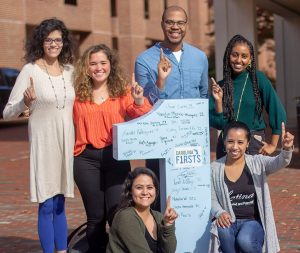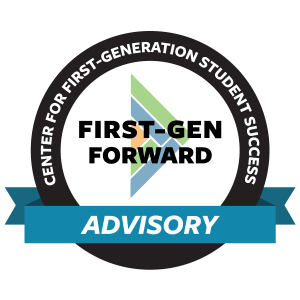Carolina is part of the first cohort of institutions recognized by the Center for First-generation Student Success, an initiative of NASPA-Student Affairs Administrators in Higher Education and The Suder Foundation.

The University of North Carolina at Chapel Hill has been named a “First Forward Advisory Institution” and is among the inaugural cohort of academic institutions nationwide being recognized for their commitment to supporting first-generation students.
The Center for First-generation Student Success, an initiative of NASPA-Student Affairs Administrators in Higher Education and The Suder Foundation, made the announcement today (May 1).
Carolina was among only nine institutions named “advisory institutions” and tapped to serve in a leadership capacity for First Forward due to a long-standing commitment to first-generation students and an ability to serve as a mentor to other selected institutions.
The First Forward designation recognizes institutions of higher education that are improving experiences and advancing outcomes of first-generation college students. Selected institutions receive professional development, community-building experiences and a first look at the center’s research and resources.
Designated faculty and staff at First Forward Institutions will also have multiple opportunities to engage with peer and aspirational institutions that are creating environments to improve the experiences and outcomes of first-generation students.
UNC-Chapel Hill, which offers numerous initiatives focused on first-generation students, was recognized specifically for Carolina Firsts, offered through the Office of Undergraduate Retention in the Office of Undergraduate Education in the College of Arts & Sciences, and Carolina Grad Student F1RSTS, offered within The Graduate School’s Diversity and Student Success program.
Carolina Firsts was created in 2008 with support from the Office of Undergraduate Retention and New Student & Family Programs to create a sense of community for first-generation college students, who make up nearly 20 percent of UNC-Chapel Hill’s undergraduate population. Carolina Firsts programs support students through signature events such as a welcome back reception and a graduation recognition and pinning ceremony, as well as individual student success consultations.
Carolina Firsts also hosts regular trainings and professional development sessions for faculty and staff to become official advocates for first-generation college students at Carolina. The Carolina Firsts program portfolio also includes the first collegiate honors program in the nation designed specifically for first-generation students.
“What distinguishes Carolina Firsts is that we have a clear framework that guides our support for students, we encourage students to explore opportunities they would not normally seek, we help connect them with faculty and staff, and we celebrate their unique contributions to the University,” said Carmen Huerta-Bapat, Carolina Firsts program director.
 Two years ago, with generous support of the Lookout Foundation, the Lookout Scholars Program was created to support incoming first-generation college students. The Lookout Scholars program, directed by Carmen Gonzalez, offers Carolina Firsts a rich cohort experience designed to develop citizen leaders.
Two years ago, with generous support of the Lookout Foundation, the Lookout Scholars Program was created to support incoming first-generation college students. The Lookout Scholars program, directed by Carmen Gonzalez, offers Carolina Firsts a rich cohort experience designed to develop citizen leaders.
Last summer, the inaugural Cumpston Fellows First-Generation Student Initiative, through Lookout Scholars, allowed first-generation students to study abroad with the intention of examining their first-generation identity while being introduced to qualitative research. Through “Navigating Education in Borderlands,” they explored the concepts of borders and borderlands with experiences in Arizona and Mexico.
Carolina Grad Student F1RSTS began as the idea of three graduate students within the Gillings School of Global Public Health, in their work as 2015-2016 Leadership Development Scholars within The Graduate School. They created a project focusing on developing a means of providing resources and networking for first-generation graduate students. The first events were held at the Gillings School of Global Public Health before The Graduate School incorporated the initiative into Diversity and Student Success during the 2016-2017 academic year.
Carolina Grad Student F1RSTS now offers a wide variety of activities and networking opportunities for graduate students campus-wide whose parents or guardians have not earned master’s or doctoral degrees. Among the events are a speaker series bringing scholars to campus who specialize in research on first-generation undergraduate and graduate student experiences, professional development workshops and monthly socials.
“First-generation graduate students are often at risk of not completing their degrees, let alone even pursuing a graduate education, because they’re not sure they belong. Imposter syndrome is very real, and, through Carolina Grad Student F1RSTS, we are able to help provide the support and encouragement to keep moving forward,” said Maria Erb, co-director of Diversity and Student Success.
“As the first person in my own family to pursue an undergraduate and graduate degree, the fact that I get to encourage, support and be inspired by our first-generation graduate students means the world to me.”
As members of Carolina Grad Student F1RSTS, graduate students also join the comprehensive Diversity and Student Success network, which also includes initiatives supporting international, military-affiliated, minority and LGBTQIA+-identified graduate students. Diversity and Student Success recently received a 2019 Diversity Award for intergroup collaboration from the UNC-Chapel Hill Office for Diversity and Inclusion.
Carolina Firsts and Carolina Grad Student F1RSTS regularly collaborate to highlight the importance of first-generation students within the Carolina community. In fall 2018, the initiatives participated in the national First-Generation College Celebration.
Programs in the College of Arts & Sciences and The Graduate School for first-generation students are made possible through the generous support of the Office of the Chancellor, the Office of the Executive Vice Chancellor and Provost, Student Affairs, U.S. Department of Education grant funding, alumni and private donors.
NASPA-Student Affairs Administrators in Higher Education is the leading association for the advancement, health and sustainability of the student affairs profession.
